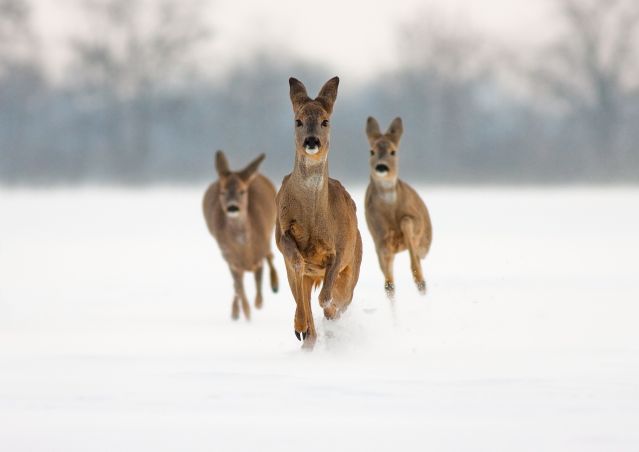Appetite
The Wonders of Awe
What is behind our fascination and appetite for this complex emotion?
Posted November 11, 2022 Reviewed by Kaja Perina
Key points
- Awe experiences have been shown to have a variety of well-being benefits.
- Not every experience of relishing the beauty of nature has to do with awe.
- Awe differs from other positive emotions in a number of ways.
- Awe plays an important role in leading a psychologically rich life.

“When it’s over,” writes Mary Oliver in When Death Comes, “I want to say all my life I was a bride married to amazement. I was the bridegroom, taking the world into my arms.”
A life spent in matrimony with wonder is likely one brimming with color and delight. According to research on awe, it might also bear an assortment of well-being-boosting gifts—some unsurprising (physical and psychological health, feelings of interconnectedness), others unexpected (the perception of having more time, more pro-sociality, less materialism, less aggression).
Considering our appetite for awe and its endless benefits, should we not become as diligent with penciling it into our daily routines as we are with our other life-enhancing habits? All may not be so straightforward, says psychologist Lani Shiota, who has been investigating awe for two decades. Despite scientific advances in the study of this complex emotion that dwells “in the upper reaches of pleasure and on the boundary of fear,” much mystery remains about the extraordinary ways awe binds humans to their environments and each other.
Here are 11 questions on awe with Dr. Shiota.
What are among the biggest insights you’ve gained from your research on emotions?
One insight is that emotions are not inherently “good” or “bad,” in the sense that they are always desirable or always maladaptive. Another one is that our emotions serve us. They are functional. They are a fundamental part of how we engage successfully with the world around us.
What is behind our recent fascination with awe?
Nowadays, awe is the trending emotion, the shiny new toy. People want it to solve many of their problems. This happens every time researchers dig into a potentially beneficial aspect of the human experience. There is also a tendency to assume that all effects of awe are beneficial and that awe is a constructive response in all circumstances. But I would be wary of the assumption that everything about awe is good.
How can we know that we are experiencing awe?
Using current theories, the best explanation of what defines awe as an experience is the sense that, for a moment, your mind can’t wrap itself around something. Normally, your mind wraps itself around things all the time. It engages with the world around you and says, “I understand this” and “I get that.” An awe-evoking stimulus defies that. It’s as if the mind says, “I can’t wrap myself around that. I can’t take that in. I can’t understand it.”

How does awe differ from wonder?
Emotion concepts like awe and wonder are bound within cultural and linguistic contexts. How a particular language construes the world may not reflect an innate human universal. While we happen to have two words for it in English, I have reservations about whether those are two different things. Other researchers have described awe as a brief, momentary short-circuiting of your understanding of the world in response to an extraordinary stimulus. Wonder, then, is the more lasting state—almost like curiosity—that may follow that burst of “What just happened?!”
For example, I might experience awe upon driving to a place where I can see the stars in a way I’ve never seen before. I might feel astounded and overwhelmed by the sheer quantity of the stars. Wonder might be a more ongoing, “What’s happening out there in the universe?” state, where my mind tries to follow up on my amazement. Does this reflect distinct emotion states? That depends on how we define emotion and where we draw the line between distinct and overlapping meanings.
Do we need awe to lead fulfilling lives?
The evidence suggests that a psychologically full life must include some sense of meaning or purpose. If as a result of experiencing awe, you feel like you are part of the great whole, then awe might very well facilitate that sense of meaning and purpose.
Einstein famously said, “He who can no longer pause to wonder and stand rapt in awe, is as good as dead.” While I wouldn’t go that far, for most people, continuing to learn, grow, and be awed by a world that shows them something that they didn’t imagine previously can be very rewarding. Most adults would likely benefit from having more awe experiences.
The evidence that we hunger for awe is very rich. Individually and as a society, we put massive amounts of resources into creating things that serve no function other than to awe. We build architecture to evoke awe—pyramids, cathedrals, temples, structures from all religions across the world. We find awe in natural phenomena. We enjoy performances that evoke awe. There’s something about awe that humans find sufficiently rewarding.
Why should we be more careful in what we consider an awe experience?
Being authentic about our emotional experiences is important. Not everything that feels good is awe. Not every experience of beauty or tranquility is awe. If you go for a walk in your neighborhood and relish the beauty of nature, is that awe? Maybe. But it’s also possible that what you feel is contentment or relaxation.
The benefits of that practice don’t need to have anything to do with awe to be real and valuable. I’d encourage us to be more rigorous and careful with awe, at least as a scientific concept. For example, when trying to improve people’s lives through interventions, researchers have a responsibility to clearly understand why and how something works. This can help us to optimize our recommendations.
Why is it important to discern what emotions we are feeling?
Some might say, it doesn’t matter what you call it—just know what brings you joy and meaning in life and do more of that. There is, however, evidence that people who have more fine-grained terminology for their emotions show better psychological well-being. Having a more granular concept of awe could be beneficial, because it would allow you to pinpoint the elements of various situations that have different effects on you psychologically, enabling you to seek out those situations.
For example, for me, it’s important to know that I can’t count on going for a walk in nature and experiencing awe. I may find being among trees calming, but it’s not the same as awe. Instead, truly seeking out what for me will be an extraordinary experience will require more investment on my part, more effort to break out of my routine.
What makes awe unlike other positive emotions?
Awe is very different from other positive emotions. Most positive emotions are approach-oriented. Our instinct is to engage with and move toward whatever is evoking these positive emotions—whether that’s a friend or a piece of cake. Awe is not approach-oriented—at least not physically. People are more likely to stop moving when they feel awe. While our minds may be very active, the body does not show signs of activation during an experience of awe. Also, unlike awe, most positive emotions include a smile and are at least somewhat social in nature. Awe is not—people often report awe experiences when there’s nobody around.
How can we prolong the feeling of awe?
One thing you could do is try to look at the stimulus in a different way. For example, the next time you look at the night sky, learn something about the stars (their distance from Earth, their age). Now, when you come back to that same experience of the night sky, your new knowledge can help you look at it through a different lens and kick-start awe again. The stimulus is the same, but your mind has changed and you are interpreting what you’re seeing in a new way.
Do certain people tend to experience more awe?
There are individual differences in the propensity to experience awe. People who are high on a personality characteristic called “openness to experience” might experience more awe. Children are more readily awed. Women are somewhat more likely to report awe than men. The gender differences could partly be due to the way people tend to interact with the stimulus when they are confronted with something extraordinary (for example, the degree to which they try to influence it rather than engage with it more cognitively).
What would you most want people to understand about awe?
Awe is very subjective. People typically want more awe in their lives. I think that’s because as we move through adulthood, our vision gets narrower and more focused in order to just get through our days. If you are looking for more awe, try paying attention to things that you don’t normally pay attention to. Look further away. Break out of your normal routine and observe what goes on around you. Then, you’ll likely stumble on something that will evoke awe in you.
Many thanks to Michelle “Lani” Shiota for her time and insights. Dr. Shiota is an Associate Professor of Psychology at Arizona State University.
References
Keltner, D., & Haidt, J. (2003). Approaching awe, a moral, spiritual, and aesthetic emotion. Cognition and Emotion, 17(2), 297-314.
Prade, C., & Saroglou, V. (2016). Awe’s effects on generosity and helping. The Journal of Positive Psychology, 11(5), 522-530.
Rudd, M., Vohs, K. D., & Aaker, J. (2012). Awe expands people’s perception of time, alters decision making, and enhances well-being. Psychological Science, 23(10), 1130-1136.
Stellar, J. E., John-Henderson, N., Anderson, C. L., Gordon, A. M., McNeil, G. D., & Keltner, D. (2015). Positive affect and markers of inflammation: discrete positive emotions predict lower levels of inflammatory cytokines. Emotion, 15(2), 129.
Anderson, C. L., Monroy, M., & Keltner, D. (2018). Awe in nature heals: Evidence from military veterans, at-risk youth, and college students. Emotion, 18(8), 1195.
Jiang, L., Yin, J., Mei, D., Zhu, H., & Zhou, X. (2018). Awe weakens the desire for money. Journal of Pacific Rim Psychology, 12.
Yang, Y., Yang, Z., Bao, T., Liu, Y., & Passmore, H. A. (2016). Elicited awe decreases aggression. Journal of Pacific Rim Psychology, 10.
Chen, S. K., & Mongrain, M. (2021). Awe and the interconnected self. The Journal of Positive Psychology, 16(6), 770-778.




